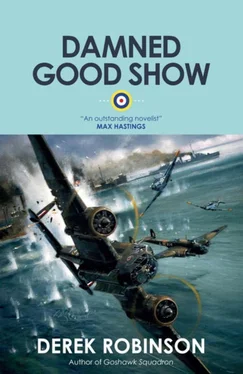Derek Robinson
DAMNED GOOD SHOW
To Flight Lieutenant Frank Lowe, DFM,
and to his comrades of RAF Bomber Command
in the Second World War.
1
The group captain aimed his pipe at the wireless set. A Mess waiter hurried to switch it off.
“Never trust a man who carries an umbrella wherever he goes,” Rafferty said. “He thinks it will protect him. He deludes himself.”
“I know it’s a big job, being Prime Minister,” Hunt said. “I just wish he wouldn’t sound like an undertaker who’s lost the body.”
They were in the Mess anteroom of RAF Kindrick, a bomber base in Lincolnshire. From here, 409 Squadron flew twin-engined Hampdens.
Only a handful of officers had joined them to hear the Prime Minister’s broadcast. 409 Squadron had been on alert for a week, and all flying personnel were in their crew rooms, listening to their own wireless sets. Rafferty was station commander: a big, broad, hook-nosed group captain with medal ribbons and faded wings from the First World War. Wing Commander Hunt led the squadron. He was thirty and looked younger, except for his eyes. Peacetime flying in the RAF had always been a risky business. Before they got Hampdens, 409 had flown canvas-skinned, fixed-wheel, open-cockpit biplanes that were not far removed from the machines of the Royal Flying Corps. Hunt liked a degree of danger; he believed the RAF thrived on it, and ultra-cautious pilots annoyed him. But he also resented pointless waste, including time wasted writing letters to next of kin. His feelings showed in his eyes. He had angry eyes.
“Chamberlain backed the wrong nag,” the Intelligence Officer said. “He’s lost his shirt.”
“Got rotten odds, anyway,” the adjutant remarked. “I said so at the time.”
“We can’t put all the blame on Chamberlain,” the Medical Officer said. “Let’s face it: everyone cheered when he flew back from Munich. ‘Peace in our time,’ he told them, and that’s exactly what they wanted to hear. Even the Daily Express—”
“Gibberish!” Rafferty said. “Pure gibberish. He waved that bloody silly piece of paper as if Hitler had very kindly given him the last bit of bog-roll in Europe.”
“In a sense, he had,” the Intelligence Officer said.
“That speech…” The adjutant pointed at the wireless. “I wonder if he wrote it. ‘Consequently this country is at war with Germany’… Not the most thrilling call to arms I’ve heard.”
“And all in aid of Poland,” the Intelligence Officer said. “That’s a clever trick, considering Poland’s beyond the range of any of our bombers.”
“Cheer up!” Rafferty heaved himself out of his armchair, and everyone stood. “The good news is we’re in business! The balloon’s gone up. The gloves are off, the fat’s in the fire. Cry havoc and something something something.”
“Let slip the dogs of war, sir,” the MO said.
“Too damn true,” Hunt said. He looked at his watch. “Briefing in twenty minutes.”
2
It was the wrong kind of day to go to war: mild, sunny, not much breeze. That sort of weather, in early September, was meant for watching a decisive match in the county cricket championship, with a pint of beer and a popsy who couldn’t tell a square cut from a ham sandwich, and didn’t care either. Rafferty was forty-three, a bit old for popsies. As he strolled with Hunt to the briefing room, he was thinking about that line, Let slip the dogs of war. Did it do justice to the boys of 409 Squadron? Dogs of war? Decent, cheery, honorable chaps? Then he remembered some of the pilots he’d known in the RFC. Not what you’d call nice men. Ruthless killers, more like. Fellows who didn’t enjoy their breakfast unless they’d crept up behind some foolish Hun, put twenty rounds in his petrol tank and made a flamer of him. Dogs of war, all right. About as chivalrous as jackals. Still, this war would be different. The bomber boys weren’t looking for blood, their job was to knock out precise military targets, every bomb a coconut, until one day Der Fuehrer would discover that he had no more toys to play with. With pluck and skill, 409 could become the crack squadron of Bomber Command. With a bit of luck, Rafferty could become an air vice-marshal. Press forward hard enough, and you find yourself leading. Quite right, too.
Hunt wasn’t thinking about promotion. He was wondering what it would be like to lead a squadron in action. He had a small face and a slim build. His nickname was Pixie, not very flattering but he didn’t mind because it meant that careless pilots who were called to his office got a shock from the blast he delivered. Some came out looking whipped. In the Mess, Pixie Hunt was relaxed, sometimes funny, and he enjoyed argument. In the air, he demanded high standards of flying and a fiercely competitive spirit. When one of his pilots began running around the airfield every day, in training for the marathon in the next Olympic Games, Hunt got rid of him. He had nothing against the Olympics, but there was room for only one obsession in this squadron.
That was in peacetime. Hunt wasn’t so blinkered as to think that 409 was trained to the peak of perfection. For a start, fuel and ammunition had been rationed—the Air Ministry was always on a tight budget—so there was very little night-flying, and usually none at weekends. For the same reason, his crews had no permanent air gunners or wireless operators. Those jobs were done by volunteers from the groundcrew, fitters or electricians or armament mechanics, as and when they could be spared from their duties. An AC2—the lowest rank in the RAF—got paid an extra sixpence a day for manning a gun in a Hampden. An AC1 or LAC got a shilling for manning a gun and a radio. Brave men and keen, and Hunt knew they’d do their best against the enemy, but he’d seen their scores at the annual gunnery exercises: dismal.
At least the gun positions were enclosed, so gunners weren’t exposed to the freezing, battering gale as they had been in the bombers that the Hampden replaced. Too bad it didn’t have powered turrets. Swinging a machine gun was hard on the arms. It took a lot of practice for a gunner to track his target, especially when it was a fighter that was diving and skidding and rolling at two or three hundred miles an hour and looking thinner than a pencil when it was only two hundred yards away. Hunt knew that his part-time gunners never got enough practice.
Too late to worry about that now.
He followed Rafferty into the briefing room. All the aircrew officers were there. They stood. One direct hit from a Hun bomb and 409 would be finished , Hunt thought; and was immediately ashamed of such alarm and despondency.
Rafferty told everyone to sit.
“They’ve started it,” he said. “Again. Some people never learn. Now it’s up to us to finish it. Well, I know the Hun, and I’ll tell you this: when you kill him he’s dead. We killed great quantities of Huns in the last show. We duffed up the Hun then, and we’ll duff up the Hun again now. Wing commander?”
Hunt stepped forward.
“War is full of surprises,” he announced. That got their full attention. “Here’s the first. The United States of America is involved. President Roosevelt has asked all the nations at war not to bomb civilians.” He let the words sink in. “Mr. Roosevelt doesn’t want us to bomb undefended towns. That’s not a problem, we weren’t intending to bomb them anyway. He also doesn’t want us to attack any target if there’s any risk of hitting civilians living nearby. Britain has agreed. So has France. It comes to this, gentlemen: we must not bomb the German mainland.”
Читать дальше












